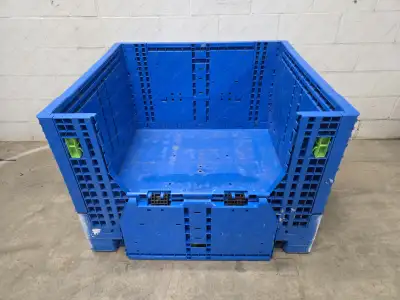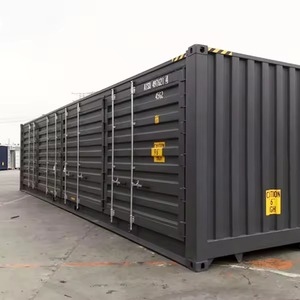Why Bulk Containers Are Important for Economical and lasting Transport
Bulk containers play a necessary role in modern logistics. They help with the reliable movement of big amounts of items, thereby optimizing transportation processes. This method not just minimizes costs but likewise lessens environmental impact through reduced discharges and waste generation. As sectors seek more lasting methods, the adoption of bulk containers is coming to be progressively substantial. What ramifications does this shift hold for future logistics and supply chain monitoring?

The Benefits of Utilizing Mass Containers in Logistics
Mass containers revolutionize logistics by enhancing effectiveness and sustainability. These containers permit for the transport of large amounts of products in a solitary trip, noticeably lowering the number of trips required. This not just improves operations however additionally lessens labor expenses related to handling, loading, and dumping. Additionally, bulk containers are developed to optimize space utilization within transportation vehicles, making sure that more products can be shipped all at once.
The standardization of mass containers additionally streamlines the logistics procedure. With uniform dimensions, they can be conveniently stacked and saved, causing boosted storehouse administration. Bulk containers usually include resilient materials that safeguard contents from damages throughout transit, thereby lowering item loss and boosting general dependability. As a result, organizations can experience improved supply chain performance, inevitably resulting in increased earnings and customer complete satisfaction. This combination of variables makes bulk containers an essential asset in modern logistics.
Ecological Impact: Reducing Waste and Carbon Impact
As industries progressively focus on sustainability, the adoption of bulk containers has actually emerged as a vital technique for lowering waste and lowering carbon footprints. These containers decrease making use of packaging products, such as boxes and plastic, thereby significantly lowering overall waste generation. By combining deliveries, bulk containers improve transportation performance, allowing for more items to be delivered per trip. This reduction in journeys straight correlates with reduced greenhouse gas emissions, contributing to a smaller sized carbon footprint.
In addition, mass containers can frequently be recycled or reused, additionally reducing environmental influence. The longevity of these containers assurances they can hold up against numerous transport cycles, minimizing the requirement for single-use alternatives. refurbished bulk containers. By enhancing logistics and advertising effective resource use, bulk containers not only support sustainable practices but also encourage industries to align with global ecological objectives. Inevitably, their execution shows a dedication to eco-friendly stewardship and liable source administration
Expense Cost Savings: Just How Mass Containers Lower Transportation Expenditures
While lots of business seek ways to improve their bottom line, using bulk containers provides a considerable chance for reducing transportation costs. Bulk containers take full advantage of the volume of goods transferred, allowing businesses to deliver larger quantities simultaneously. This efficiency decreases the number of journeys required, directly lowering fuel costs and decreasing labor costs related to loading and discharging.
Furthermore, bulk containers often include streamlined layouts that enhance space usage within transport vehicles. This indicates fewer voids, leading to a lot more effective use available capability. Furthermore, the longevity of bulk containers can decrease the danger of item damage throughout transit, making sure and decreasing losses that even more goods get here intact.
Enhancing Supply Chain Efficiency With Mass Storage Solutions
Bulk storage space solutions play a crucial role in improving supply chain effectiveness by maximizing stock administration. By consolidating products right into fewer, larger containers, businesses can considerably minimize taking care of costs related to constant transfers and processing. This structured strategy permits much better tracking and administration of stock, inevitably leading to boosted functional efficiency.
Streamlined Inventory Monitoring
Effective inventory management is crucial for optimizing supply chain procedures, specifically when companies take on bulk storage space remedies. These options allow services to keep greater supply degrees while decreasing the regularity of replenishment. By settling products right into bulk containers, companies can streamline their supply procedures, lowering the intricacy linked with tracking several smaller packages. used bulk containers This approach assists in precise inventory counts and boosts projecting accuracy, permitting more enlightened decision-making. In enhancement, mass storage space services streamline stockroom organization, making it less complicated to locate and access items when needed. As a result, companies can accomplish an extra effective supply turn over price, eventually improving total supply chain performance and decreasing the chance of stockouts or overstock circumstances.

Reduced Handling Expenses
The execution of bulk storage options not only improves inventory monitoring but also substantially decreases taking care of costs across the supply chain. By settling materials right into bulk containers, firms lessen the need for constant handling and transfer between various storage space and transport systems. This strategy lowers labor prices connected with loading, dumping, and relocating smaller sized packages. Additionally, bulk storage space decreases the regularity of shipments, bring about reduced transport prices and lowered gas intake. Consequently, organizations can maximize their logistics procedures, enabling a more efficient allotment of resources. Eventually, minimized handling costs contribute to enhanced overall supply chain efficiency, fostering an atmosphere that sustains both sustainability and economic practicality.

Adaptability of Bulk Containers Across Numerous Industries
Several markets have unique needs for transport and storage, mass containers have arised as a functional service that fulfills a broad variety of demands. These containers, varying from huge containers to specialized containers, can suit varied products, including powders, liquids, and granules. In the farming sector, mass containers facilitate the transportation of grains and plant foods, while the food and beverage market uses them for components and completed products. The chemical industry relies upon bulk containers for safely transporting hazardous materials, making sure conformity with safety and security laws. In addition, construction firms take advantage of mass containers for carrying aggregates and other products. Their flexibility includes different settings of transportation, including vehicles, trains, and ships, enhancing logistical performance. This convenience not only streamlines procedures throughout various markets however likewise promotes sustainability by minimizing packaging waste and optimizing room in transit. Mass containers play an important role in modern-day supply chain monitoring.
Future Fads in Bulk Container Use and Sustainability
The future of bulk container use is increasingly formed by ingenious materials growth that enhances sustainability. In addition, automation in logistics promises to simplify procedures, minimizing waste and improving effectiveness. Embracing round economy techniques will additionally revolutionize exactly how bulk containers are created, utilized, and reused, fostering a much more sustainable transport landscape.
Cutting-edge Materials Advancement
As sectors significantly prioritize sustainability, ingenious products development in bulk containers arises as a significant consider boosting environmentally friendly transport solutions. Suppliers and researchers are checking out eco-friendly plastics, recycled compounds, and lightweight metals to minimize ecological influence. These materials not only reduce waste however additionally boost gas efficiency by decreasing the overall weight of containers. Furthermore, developments in wise products, which can adjust to varying conditions, improve the resilience and performance of mass containers. The integration of these innovative products straightens with circular economy principles, advertising reuse and recycling. As the need for lasting techniques expands, the advancement of such products will certainly play an essential duty fit the future of mass container use in logistics and transport.
Automation in Logistics
Considerable improvements in automation are poised to transform logistics and the usage of bulk containers, enhancing sustainability in transportation. Automated systems, consisting of drones and independent vehicles, are simplifying the motion of mass containers, reducing the dependence on standard fuel-powered transportation. These technologies optimize routing and filling procedures, improving and minimizing vacant miles gas efficiency. In addition, automated supply administration systems enhance monitoring and tracking of bulk containers, guaranteeing better source allowance and decreased waste. The assimilation of the Net of Points (IoT) enables real-time information evaluation, allowing aggressive decision-making that lines up with sustainability goals. As automation remains to advance, it is anticipated to drive additionally developments in bulk container usage, inevitably sustaining more sustainable logistics methods and reducing the ecological impact of transport.
Round Economy Practices
Improvements in automation are establishing the stage for a much more integrated approach to circular economy practices in the domain of bulk container usage. As markets significantly welcome sustainability, mass containers are being created for longevity and reusability. This shift not just lessens waste but likewise enhances resource performance. Companies are embracing strategies such as closed-loop systems, where used containers are gathered, reconditioned, and reestablished into the supply chain. Furthermore, wise technologies track container life process, helping with much better monitoring and reducing environmental effect. The cooperation in between manufacturers, logistics carriers, and end-users is important in establishing requirements for lasting container usage. used collapsible bulk containers. Future patterns show a growing emphasis on materials that are recyclable and eco-friendly, additional enhancing the round economy's principles wholesale transport

Regularly Asked Concerns
What Products Are Mass Containers Commonly Made From?
Bulk containers are typically constructed from sturdy products such as high-density polyethylene, cardboard, steel, and light weight aluminum. These materials provide toughness, security, and versatility, making them suitable for delivering various products in various industries effectively.
Just how Do I Select the Right Dimension Mass Container?
Selecting the best size bulk container entails evaluating the volume of products to be transported, considering dealing with devices compatibility, and appraising storage area requirements. Proper size warranties effectiveness in transport and minimizes waste during delivery.
Are Mass Containers Reusable or Recyclable?
Bulk containers are commonly recyclable, made for numerous journeys, enhancing sustainability. Many can additionally be reused, depending upon the materials used. Picking recyclable options even more minimizes and supports environmental objectives waste in transport methods.
What Safety And Security Rules Put On Bulk Container Transport?
Security policies for bulk container transport consist of compliance with the Division of Transportation standards, appropriate labeling of hazardous products, structural honesty evaluations, and adherence to weight limits to assure risk-free handling and prevent crashes throughout transit.
Exactly How Can Companies Transition to Using Mass Containers Efficiently?
Services can alter to bulk containers by reviewing existing logistics, training staff on handling, purchasing ideal devices, enhancing supply monitoring, and working together with suppliers to ensure compatibility and effectiveness throughout the supply chain.
As industries increasingly prioritize sustainability, the fostering of bulk containers has actually emerged as a key approach for minimizing waste and decreasing carbon footprints. By combining materials into bulk containers, business can streamline their supply procedures, lowering the intricacy linked with tracking numerous smaller bundles. As sectors increasingly prioritize sustainability, cutting-edge products development in bulk containers emerges as a considerable element in improving environment-friendly transport options. Automated systems, including drones and self-governing vehicles, are improving the motion of bulk containers, minimizing the dependence on standard fuel-powered transportation. Furthermore, automated stock monitoring systems improve tracking and tracking of mass containers, guaranteeing far better source allotment and minimized waste.